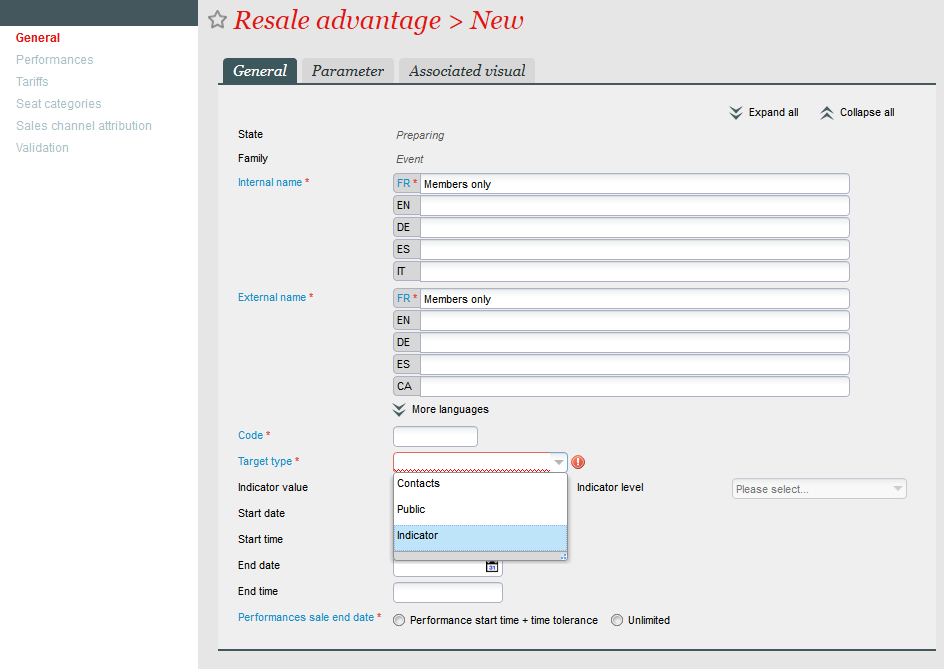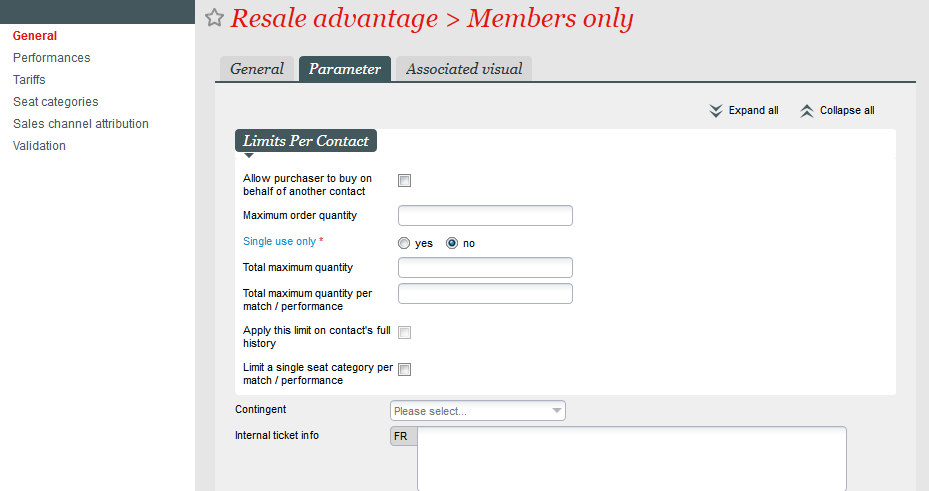A new type of advantages allows you to define which contacts are eligible to purchase certain tickets on the resale platform. You can also enforce contact limits across primary and secondary market sales channels.
The resale platform is a great tool to better control the secondary market. However, while you could limit who could buy on your primary market sales channels, it was not possible to achieve the same on the secondary market sales channel until now.
Solution
We are introducing a new sort of advantage dedicated to the secondary market: resale advantage. Resale advantage allow you to target tickets when they are put up for resale based on performance/match, tariff, seat category and contingent and limit who can purchase them. You can also use those advantage to enforce limits per contact that will take into account both the primary and secondary market purchase history.
Getting started
Catalogue configuration
In the catalogue module, a new Resale advantage menu entry lists this new sort of advantage. Those advantage are based on the standard ones but with a few adaptation, e.g., there is no notion of quota and no associated rate tables, as those are dictated by the number of tickets put on the resale and the price rules for that specific product. Nonetheless the rest of the configuration is very similar.
Resale advantages are available for the following product families:
- Events
- Competition
- Open pass
There are 3 types of targets available:
- Public: useful to enforce limits per contact but without limiting who can buy on the resale platform.
- Indicator: similar to regular indicator advantage targeting contacts based on indicator values.
- Contacts: similar to regular contacts advantage targeting contacts on an explicit list of contacts, created using a SAM campaign. Note that once a contact is associated to an advantage, he/she will see all the tickets linked to the advantage, even those linked before he/she was entitled to that advantage.
The rest of the configuration will allow you to define which tickets should be linked to the advantage, based on the configured performances/matches/products, tariffs and seat categories.
The resale advantage must of course be activated for the resale platform in the Sales channel attribution screen and running.
If a resale advantage is suspended (or inactive because of end date/time), any ticket linked to that advantage will become public, so available for anyone to purchase. Modifications to a running resale advantage should and can be done without suspending it.
The link between tickets and the resale advantage only happens when a ticket is put on resale. This means that the resale advantage will not apply to tickets that were already put on resale prior to the creation of the resale advantage. To apply it retroactively, tickets should be remove from resale and put back on resale, e.g., from the back-office.
Note that, in the case of "contact" resale advantage, the time when the linking happens does not affect who in the contact associated with the advantage can see the tickets, i.e., if a contact is added after a ticket is linked to the advantage, that contact can still see ALL the tickets linked to that advantage.
Resale platform configuration
Contrary to regular advantages that will allow selling products even if the product itself is not available in that sales channel, resale advantages require that the activity and product profile of the resale platform also contain those particular performances/matches/products, tariffs and seat categories.
Resale platform purchase
For the resale platform user, the experience is transparent. Tickets linked to a resale advantage will appear in the same list of available for the selected product. There is no dedicated advantage screen as in the case of the primary market sales channels (B2C ticketshop).
The actual link between the ticket and the resale advantage will be created at the time the ticket is put on the resale platform. When the ticket's resale is cancelled, the linked is removed and the check will happen again, if the tickets is put on the resale platform again. A ticket may be linked to more than one resale advantage.
A user of the resale platform will be able to purchase any ticket that is either:
- not linked to any advantage
- linked to at least one advantage available for that user
Note that, on the resale platform, the availability will display the total number of tickets available for that performance/match/product, regardless of the linked advantages. This means that some users may actually only be able to purchase less than that, depending on their rights to access the advantages.


